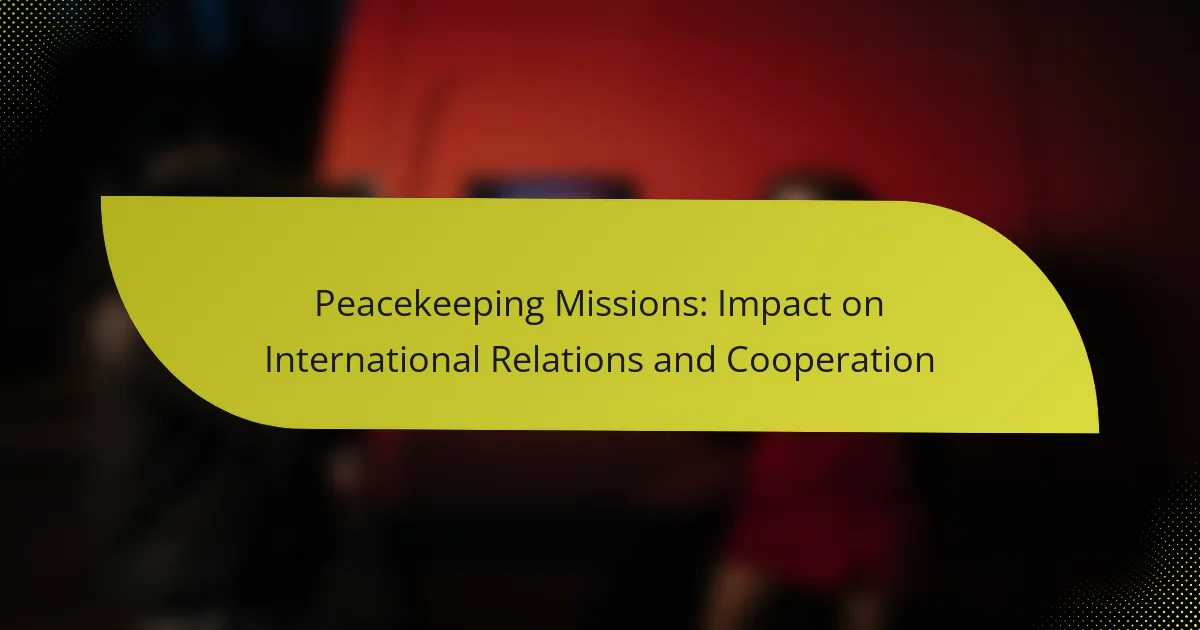Peacekeeping missions play a crucial role in shaping international relations by promoting dialogue and cooperation among nations. By providing a framework for countries to engage in constructive discussions, these missions help reduce tensions and enhance diplomatic ties, ultimately contributing to global stability and security.
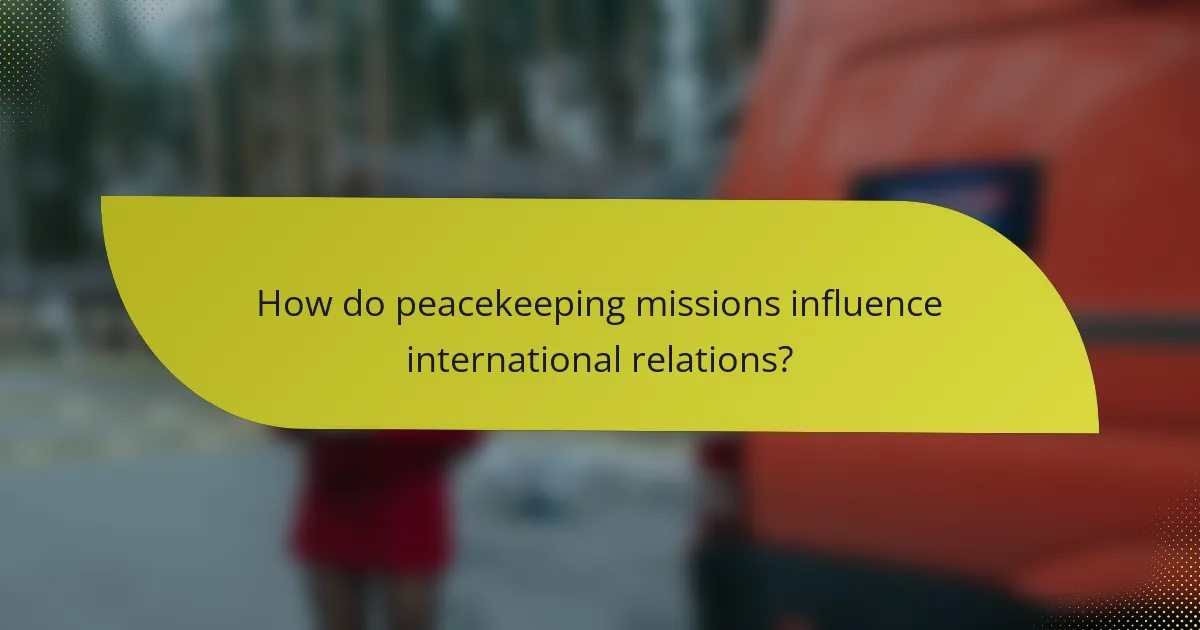
How do peacekeeping missions influence international relations?
Peacekeeping missions significantly influence international relations by fostering cooperation among nations, promoting dialogue, and reducing tensions. These missions often serve as a platform for countries to engage in constructive discussions, thereby enhancing diplomatic ties and stability.
Promotion of diplomatic dialogue
Peacekeeping missions create opportunities for diplomatic dialogue by bringing together conflicting parties under a neutral framework. This environment encourages communication and negotiation, which can lead to peaceful resolutions of disputes. For instance, peacekeepers often facilitate talks between governments and rebel groups, helping to bridge gaps and build trust.
Moreover, the presence of international peacekeepers can signal to nations that the global community is invested in resolving conflicts, prompting them to engage in dialogue rather than resorting to violence. This proactive approach can lead to long-term diplomatic relationships and stability in the region.
Reduction of conflict escalation
By intervening in volatile situations, peacekeeping missions help to prevent conflicts from escalating into larger wars. Their presence can deter aggressive actions by parties involved in a dispute, as the potential for international scrutiny increases. For example, peacekeepers may monitor ceasefires and ensure compliance, reducing the likelihood of renewed hostilities.
Additionally, peacekeeping forces often provide security for civilians and humanitarian efforts, which can stabilize communities and reduce grievances that might otherwise lead to conflict. This stabilization is crucial in post-conflict areas where tensions remain high.
Strengthening of multilateral cooperation
Peacekeeping missions enhance multilateral cooperation by requiring the collaboration of multiple countries and organizations. This collective effort fosters a sense of shared responsibility and encourages nations to work together towards common goals, such as maintaining peace and security. For example, missions often involve contributions from various countries, pooling resources and expertise.
Furthermore, successful peacekeeping operations can serve as a model for future collaborations, demonstrating the effectiveness of joint efforts in addressing global challenges. This can lead to stronger alliances and partnerships in international relations, ultimately contributing to a more cooperative global environment.
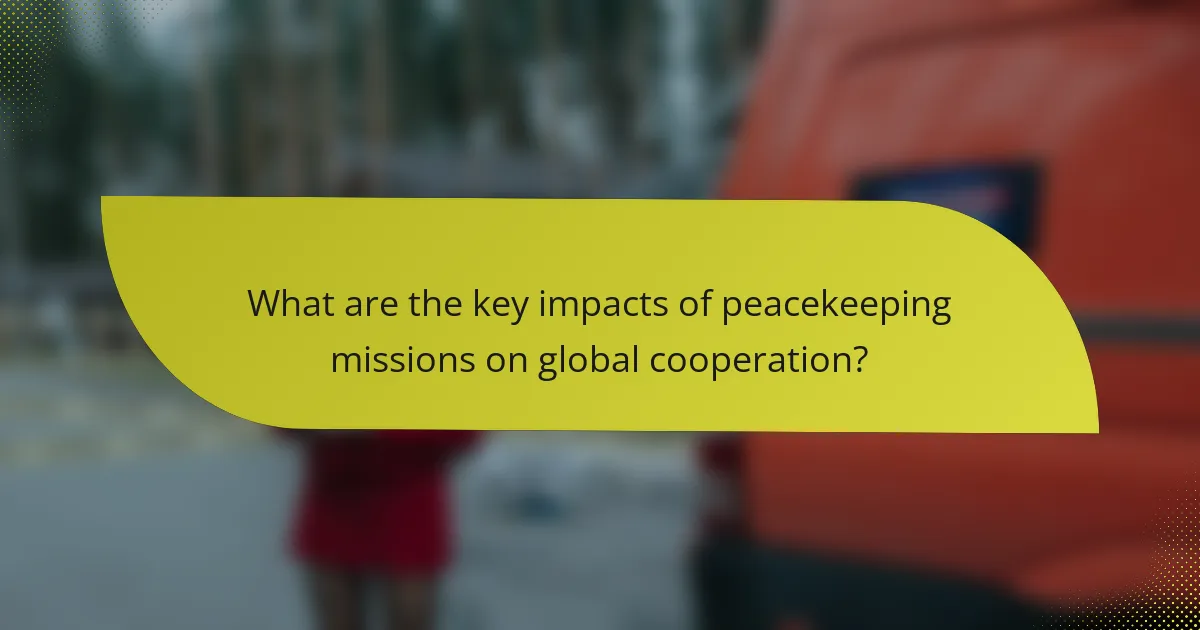
What are the key impacts of peacekeeping missions on global cooperation?
Peacekeeping missions significantly enhance global cooperation by fostering stability, facilitating humanitarian efforts, and supporting democratic governance in conflict-affected regions. These missions create an environment where nations can collaborate more effectively, ultimately contributing to international peace and security.
Facilitation of humanitarian aid
Peacekeeping missions play a crucial role in facilitating humanitarian aid by ensuring safe access for relief organizations to affected populations. They often provide security for aid workers and help establish logistics for delivering food, medical supplies, and shelter.
For example, in regions like South Sudan, peacekeepers have enabled the distribution of essential resources to millions, often in coordination with agencies like the United Nations and non-governmental organizations. This cooperation not only addresses immediate needs but also lays the groundwork for longer-term recovery.
Enhancement of regional stability
By maintaining peace and security, peacekeeping missions enhance regional stability, which is vital for fostering cooperation among neighboring countries. These missions can deter potential aggressors and reduce the likelihood of conflict spillover, creating a more secure environment for diplomatic engagement.
In the Balkans, for instance, peacekeeping forces have helped stabilize the region post-conflict, allowing for improved relations between countries like Serbia and Kosovo. This stability encourages trade, investment, and collaborative initiatives that benefit all parties involved.
Support for democratic governance
Peacekeeping missions often support democratic governance by monitoring elections, training local security forces, and promoting human rights. These efforts help establish the rule of law and encourage political participation, which are essential for sustainable peace.
In countries like Liberia, peacekeepers have assisted in organizing free and fair elections, contributing to a more stable political landscape. This support not only strengthens local governance but also fosters international trust and cooperation, as nations see the benefits of a stable, democratic partner.
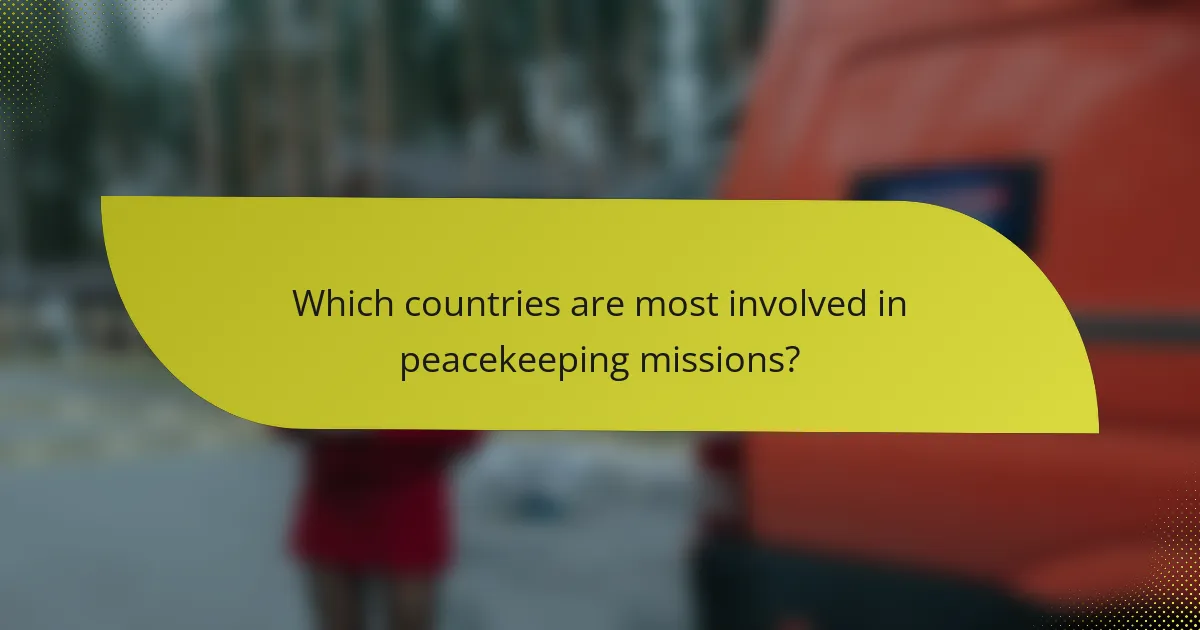
Which countries are most involved in peacekeeping missions?
The most involved countries in peacekeeping missions include the United States, China, and various European nations. These countries contribute troops, funding, and resources to support international peacekeeping efforts, often through the United Nations and regional organizations.
United States contributions
The United States is one of the largest financial contributors to UN peacekeeping missions, providing around 25% of the total budget. Additionally, the U.S. often deploys personnel and resources to support operations, focusing on conflict resolution and stabilization in regions like Africa and the Middle East.
American involvement typically emphasizes training and equipping local forces, enhancing their capacity to maintain peace. This approach aims to foster long-term stability and reduce the need for extensive foreign intervention.
China’s role in peacekeeping
China has significantly increased its participation in peacekeeping missions, becoming the second-largest contributor of troops among UN member states. China’s contributions are often focused on regions where it has strategic interests, such as Africa, where it also invests in infrastructure and development projects.
Beijing’s approach to peacekeeping emphasizes non-interference and respect for sovereignty, which aligns with its broader foreign policy goals. This strategy has led to a unique role in peacekeeping, balancing military presence with economic cooperation.
European Union participation
The European Union (EU) collectively contributes to peacekeeping missions through various mechanisms, including the Common Security and Defence Policy (CSDP). EU member states often deploy civilian and military missions to support stability in neighboring regions, particularly in the Balkans and Africa.
EU participation is characterized by a focus on diplomacy and development alongside military efforts. This dual approach aims to address the root causes of conflict, making EU missions distinct in their emphasis on comprehensive security strategies.
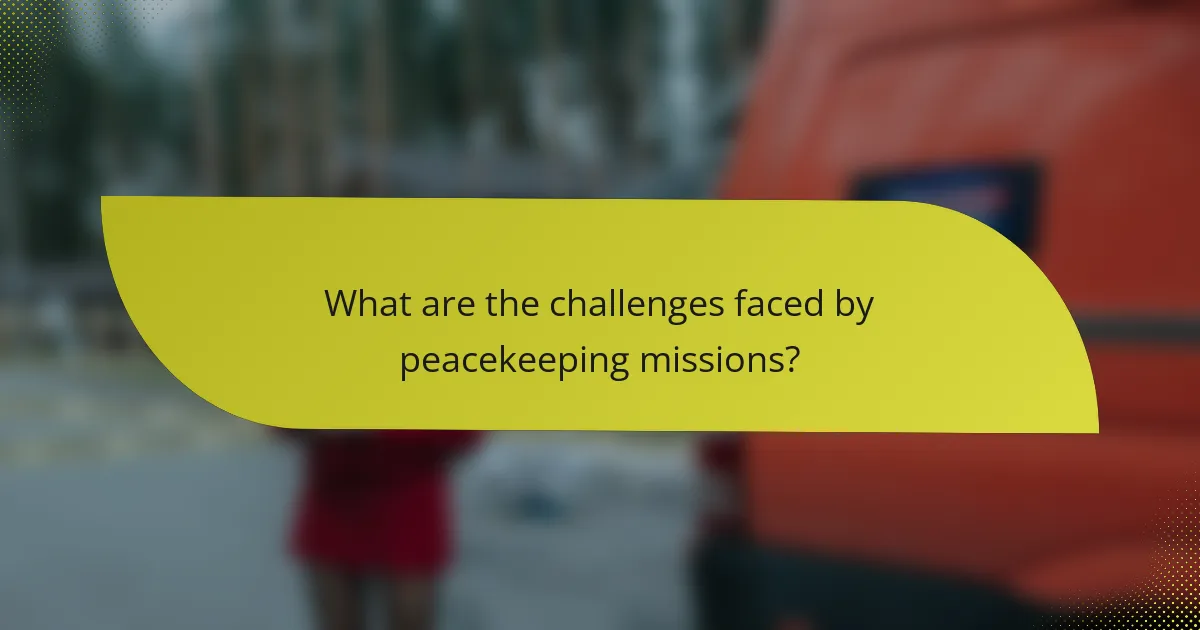
What are the challenges faced by peacekeeping missions?
Peacekeeping missions encounter several significant challenges that can hinder their effectiveness. These challenges include resource allocation issues, political will and commitment from participating nations, and security risks faced by peacekeepers in volatile environments.
Resource allocation issues
Resource allocation is a critical challenge for peacekeeping missions, as insufficient funding and personnel can limit operational capabilities. Many missions struggle with budget constraints, leading to inadequate supplies, equipment, and support services.
For example, missions may operate with a fraction of the required troops or lack essential resources like medical supplies and transportation. This can result in delayed responses to crises and decreased overall mission effectiveness.
Political will and commitment
The success of peacekeeping missions heavily relies on the political will and commitment of contributing nations. Without strong support from member states, missions may face challenges in troop deployment and sustained engagement.
Countries may withdraw support due to changing political landscapes or domestic pressures, which can destabilize ongoing operations. Ensuring consistent political backing is essential for maintaining mission momentum and achieving long-term goals.
Security risks for peacekeepers
Peacekeepers often operate in high-risk environments, facing threats from armed groups and local conflicts. These security risks can lead to casualties among peacekeeping personnel and undermine mission objectives.
To mitigate these risks, missions must implement comprehensive security protocols, including intelligence gathering and coordination with local forces. However, even with precautions, peacekeepers may still encounter unpredictable violence, making their safety a constant concern.
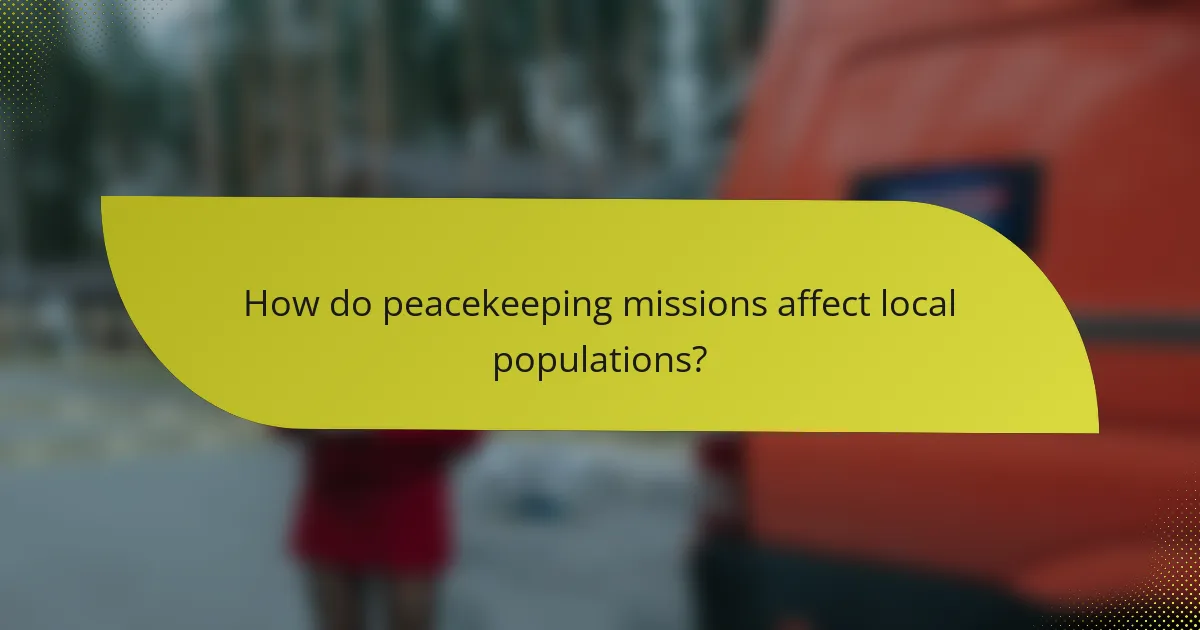
How do peacekeeping missions affect local populations?
Peacekeeping missions can significantly influence local populations by enhancing security, fostering governance, and stimulating economic development. Their presence often leads to improved stability, which can create a more favorable environment for recovery and growth.
Impact on civilian safety
Peacekeeping missions primarily aim to protect civilians in conflict-affected areas. By deploying troops and resources, these missions can reduce violence and create safer conditions for local communities.
For example, in regions where peacekeepers are stationed, reports of violent incidents often decline, allowing civilians to resume normal activities such as education and commerce. However, the effectiveness can vary based on the mission’s mandate and the cooperation of local authorities.
Influence on local governance
Peacekeeping missions can help strengthen local governance by promoting political stability and encouraging democratic processes. They often support the establishment of fair elections and the rule of law, which can empower local institutions.
In some cases, peacekeepers provide training and resources to local officials, enhancing their capacity to govern effectively. However, the long-term success of these initiatives depends on local buy-in and the sustainability of reforms after the mission concludes.
Economic effects in host countries
The presence of peacekeeping missions can have positive economic effects on host countries by creating jobs and stimulating local markets. Peacekeepers often require supplies and services, which can benefit local businesses.
Additionally, improved security can attract foreign investment, leading to further economic development. However, it is essential to manage expectations, as the economic benefits may not be evenly distributed and can take time to materialize.
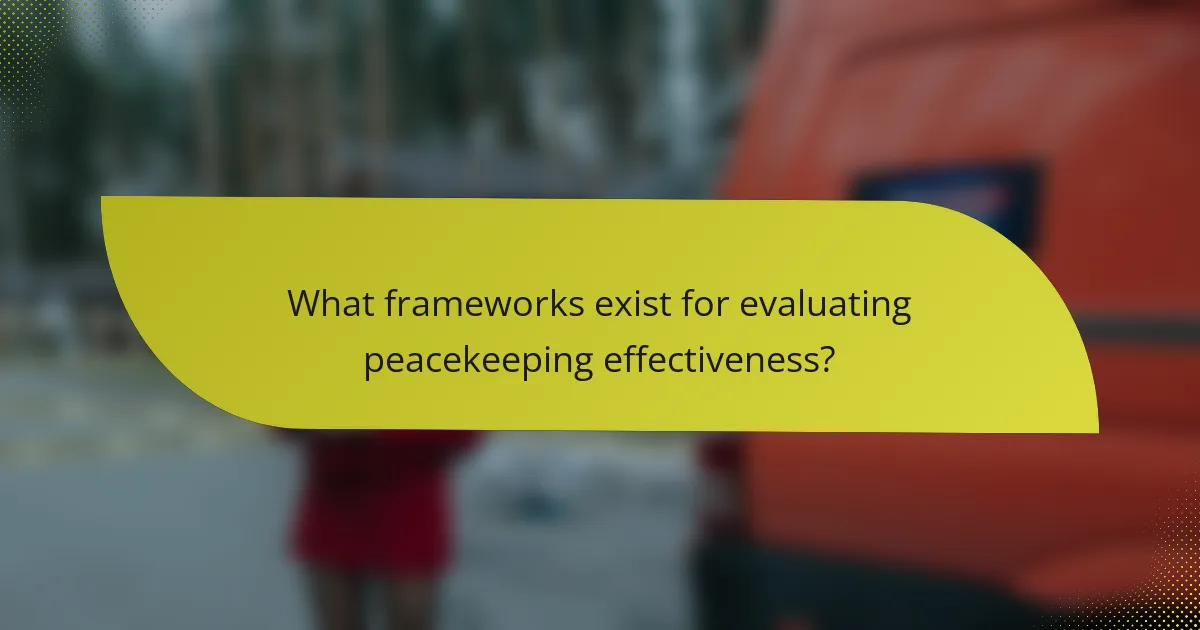
What frameworks exist for evaluating peacekeeping effectiveness?
Evaluating peacekeeping effectiveness involves various frameworks that assess mission outcomes, operational efficiency, and the impact on local stability. Commonly used metrics include the achievement of mandate objectives, the safety of civilians, and the long-term sustainability of peace in the region.
UN peacekeeping performance metrics
UN peacekeeping performance metrics focus on several key indicators, such as the number of violent incidents, the level of civilian protection, and the successful disarmament of combatants. These metrics help gauge the overall success of missions and inform future deployments.
Additionally, qualitative assessments, including feedback from local communities and partner nations, play a crucial role in evaluating effectiveness. Regular reports and reviews by the UN Security Council also contribute to understanding mission performance.
Case studies of successful missions
One notable example of a successful peacekeeping mission is the United Nations Stabilization Mission in Haiti (MINUSTAH), which helped restore order and rebuild institutions following political turmoil. The mission successfully reduced violence and contributed to the establishment of a more stable government.
Another example is the United Nations Mission in Liberia (UNMIL), which effectively disarmed thousands of combatants and supported democratic elections. These case studies illustrate how targeted peacekeeping efforts can lead to significant improvements in security and governance.
